Tech
Sign up for our newsletter
We summarize the week's scientific breakthroughs every Thursday.
-
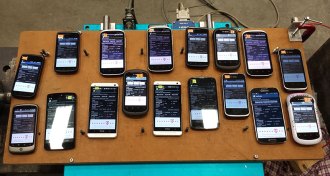 Earth
EarthNew app puts an earthquake detector in your pocket
Smartphone app MyShake uses motion-sensing accelerometers to detect nearby quakes. The app could provide early warnings of incoming tremors, its creators say.
-
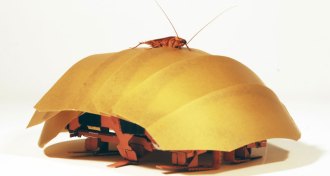 Tech
TechThis roach-inspired robot can wiggle through tight spaces
Cockroaches inspired a compressible, crevice-navigating robot.
-
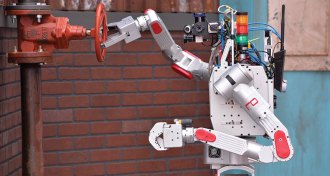 Tech
Tech‘Rise of the Robots’ chronicles race to build disaster-relief bots
NOVA’s “Rise of the Robots” lays out the difficulties of making humanoid robots that can help out in disasters.
By Meghan Rosen -
 Tech
TechPill measures gut gas
A gas-sensing ingestible capsule tested in pigs could someday help doctors assess people’s gastrointestinal health.
-
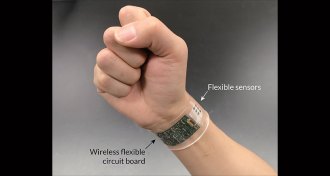 Tech
TechTracking health is no sweat with new device
New all-in-one electronic device can detect and analyze your temperature and four chemicals in your sweat.
By Meghan Rosen -
 Tech
TechMachine triumphs in strategy game
For the first time, a computer has beat a professional human player in the strategy game Go.
By Meghan Rosen -
 Tech
TechMachine trumps man in strategy game Go
For the first time, a computer has beat a professional human player in the strategy game Go.
By Meghan Rosen -
 Paleontology
PaleontologyPlesiosaurs swam like penguins
Computer simulations of plesiosaur swimming motion may resolve long-standing debate on how the marine reptile got around.
-
 Tech
TechOnline reading behavior predicts stock movements
People's current web surfing patterns predict future stock movements. The discovery could help authorities to stabilize financial markets.
-
 Environment
EnvironmentConverted milk proteins clean pollution, strike gold
A new membrane uses sticky amyloid proteins to trap contaminants in water.
-
 Earth
EarthSuccession of satellites keep eye on Earth
50 years after plans were laid for the first Earth-observing spacecraft, the youngest Landsat satellites are still flying and imaging the planet’s surface.
-
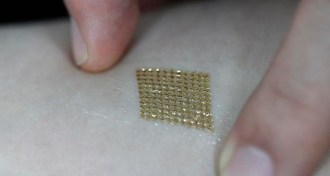 Tech
TechStretchy silicon sticker monitors your heartbeat
A new stretchy memory device looks like a temporary tattoo and works like a heart rate monitor.